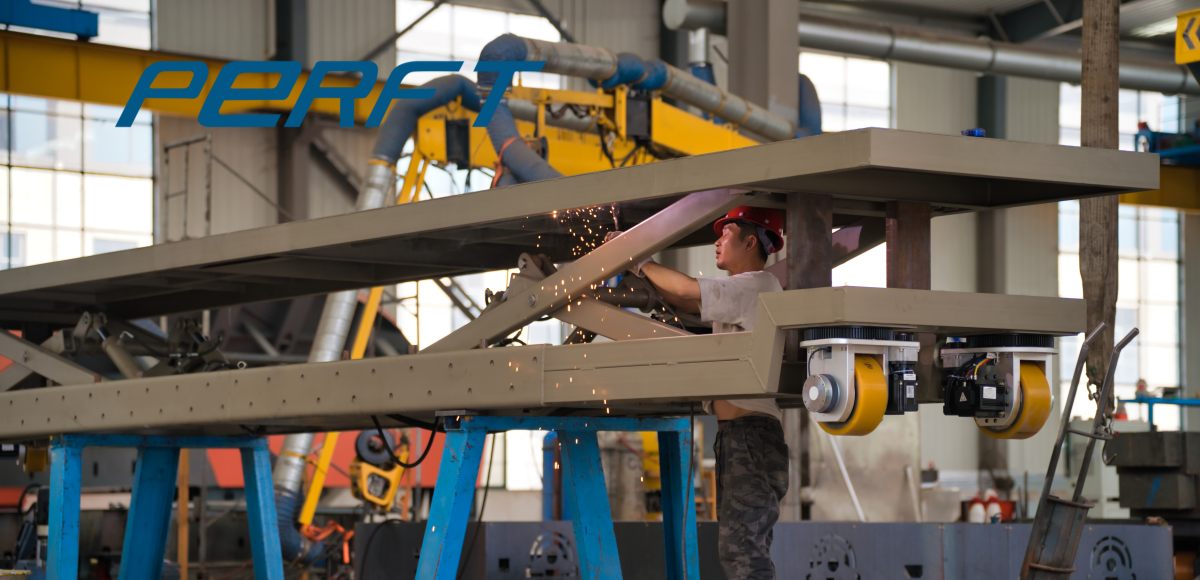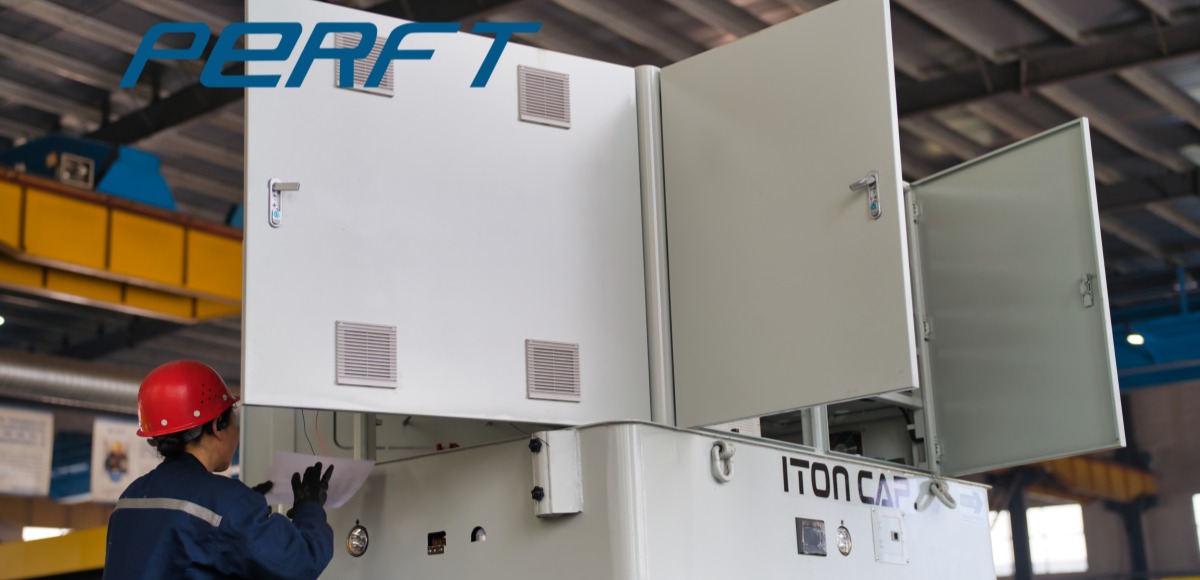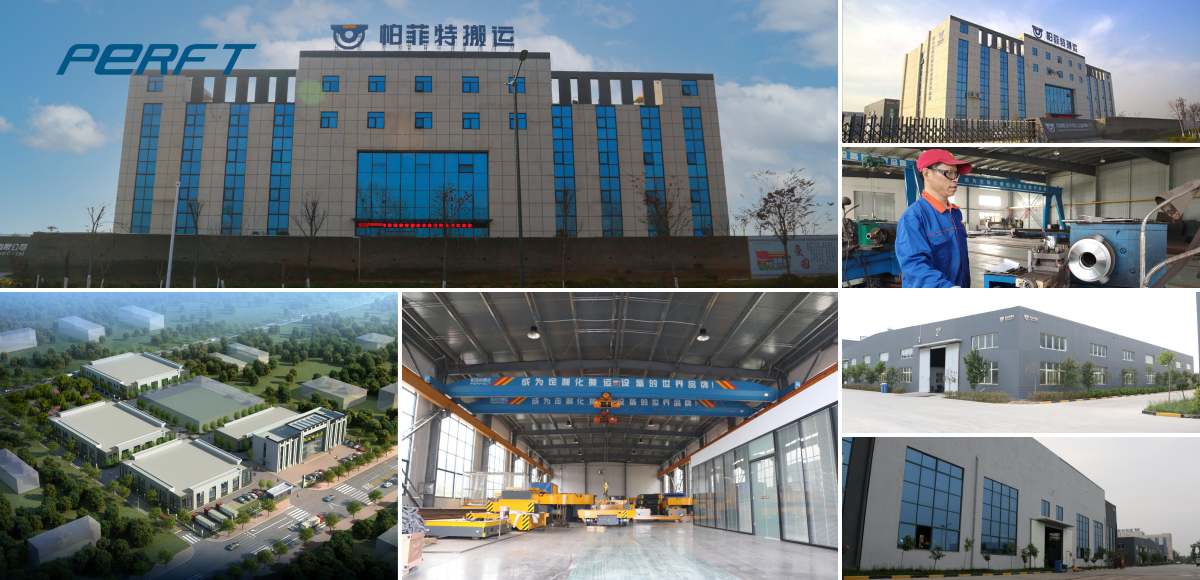Electric material handling carts are industrial-grade transportation tools designed for heavy duty material handling in warehouses or manufacturing plants. They are electrically powered and equipped with durable motors to easily carry large quantities of goods. Their autonomous drive characteristics, combined with a wide range of sizes and configurations, allow them to meet the specific needs of different industries.
Powerful Load Capacity: 1-500 tons
The load range of electric material handling carts covers from light-duty to ultra-heavy-duty requirements. In the manufacturing industry, for example, some models can carry 500 tons of large equipment. Precise load distribution calculations and centre of gravity control design ensure stability and safety during transport.
Advanced Steering System
Trackless steering design gives transfer cart a high degree of manoeuvrability, allowing it to navigate through complex warehouse layouts without the need to lay tracks. Even in narrow aisles or dense racking areas, it can achieve precise steering, significantly improving space utilisation.
Intelligent Control System
Remote control allows the operator to manage transfer trolley from a safe distance, and a tape tracking system ensures that transport routes are executed with high precision, reducing human error.
Comprehensive Safety Features
Laser scanners and collision sensors detect obstacles in real time, warning lights and cushion bumpers enhance operational safety, and emergency brake buttons meet the need for emergency response.
Ground Adaptability
Whether it is concrete, epoxy flooring or other industrial floors, electric transfer cars can operate stably. According to the friction coefficient and flatness of different floor materials, the chassis and drive system of transfer trolley have been professionally adjusted to ensure its applicability in all scenarios.

High load capacity enables an increase in the volume of a single transport and a reduction in the number of handling times. A case study of a logistics centre showed that the introduction of motorized carts reduced the material transport time by 40%, allowing employees to devote more energy to core business such as order processing, and significantly increasing overall productivity.
Traditional manual handling is not only time-consuming and laborious, but also prone to leading to employee fatigue. The application of industry transfer trolley makes heavy lifting automated, and data from an automotive factory shows that the manpower demand for related positions has been reduced by 60%, significantly reducing labour costs.
According to statistics, about 30% of industrial accidents are related to heavy load handling. Electric transfer trolley avoids manual lifting through automated operation. After the introduction of the equipment in an electronics factory, the number of lifting-related injuries dropped by 85%, creating a safer working environment.
From large pallets to industrial equipment, electric industry transfer cars can handle all types of heavy loads. Compared with traditional forklifts that require multiple units, a single high load motorized transfer trolley can complete the task, reducing equipment investment and management complexity.
Seamless connection with automated warehousing system, support for preset routes and variable speed operation. In an intelligent warehouse case, electric transfer cart is linked with the WMS system to fully automate the order fulfilment process and increase the picking accuracy rate to 99.9%.
Although the initial purchase cost is higher than that of traditional equipment, the low maintenance cost and long service life of motorised transfer cars (typically up to 10 years or more) result in a lower TCO from a full lifecycle perspective.

Large U.S. manufacturing and logistics organisations demand the highest levels of efficiency. In scenarios such as Amazon’s logistics centre, electric transfer carts are used on a large scale to achieve the flow of thousands of pieces of goods per hour, supporting a huge supply chain system.
OSHA (US Occupational Safety and Health Administration) has strict specifications for manual handling. The use of motorised trolleys helps companies avoid the risk of non-compliance.
Units are designed with industrial-grade durability to handle 24/7 continuous operation. In scenarios where downtime is not an option, such as automotive production lines, the high reliability of electric transfer trolleys ensures zero interruptions in the logistics process and stable production capacity.
Electric transfer trolleys can be customised to meet the needs of the US industry, such as anti-corrosion requirements for the food cold chain and high-precision requirements for aerospace manufacturing.
Defining the weight and dimensions of the load is the basis for selection. From 1 ton light duty to 500 tons extra heavy duty, the choice is based on the maximum load scenario in the production process. The shape of the load, e.g. long, palletised, etc., must also be taken into account to ensure that the frame structure matches.
Aisle widths and floor levels are of concern in indoor warehouses, while gradients and weather impacts need to be considered in outdoor scenarios. In the case of a construction site, industry transfer cart with a climbing function is used.
Indoor environmental scenarios: Lithium batteries are preferred for easy charging and no emissions.
Continuous operation scenarios: cable reel or skid line power supply, to avoid range anxiety.
Manual control for simple scenarios. Remote control for hazardous areas.
LIDAR, ultrasonic sensors, and crash cushioning are the basics.
Standard models may not meet special needs. For example, a medical equipment company customised anti-static electric carts, through special coating and grounding design, to eliminate the risk of damage to precision instruments.
Pay attention to the supplier’s maintenance response speed and spare parts inventory. High-quality service providers such as Perfect provide 7×24-hour support, extending equipment life and reducing downtime losses through preventive maintenance programmes.

More than just a piece of equipment, motorized material handling cart is at the heart of the transformation of industrial efficiency. Their strategic value has been proven in industries across the globe, from productivity to safety, from cost optimisation to automation. For companies seeking digital transformation, choosing the right electric material handler is laying the foundation for operational competitiveness for the next decade.
